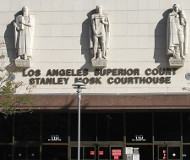8/15/2014
Redflex Unlawful Termination Lawsuit Kicked Back To State CourtRedflex battles ex-executive vice president over his firing in bribery scandal.

After wasting months of the federal court's time, Redflex and the Australian firm's former executive vice president returned Thursday morning to the Stanley Mosk Courthouse in Los Angeles, California to provide Superior Court Judge Susan Bryant-Deason with an update on their unlawful termination dispute.
Redflex fired the first shot in the legal tussle by suing Aaron M. Rosenberg, a former top executive, over his role in the Chicago, Illinois bribery scandal. Rosenberg countersued in a California court, claiming he was merely acting under orders from his superiors at Redflex and that the Australian firm has been using him as a scapegoat. Redflex removed the case to a federal court in May.
Rosenberg has been cooperating with federal prosecutors, freely admitting that he bribed clients in a dozen states on the orders of his boss, Karen Finley, who was indicted for corruption on Wednesday.
Last month, US District Court Judge George H. Wu granted Rosenberg the right to cross-examine Redflex witnesses to establish whether he was the employee of a legitimate California company, or whether "Redflex California" was a sham. The answer to this question would determine whether the state or the federal court should assume jurisdiction over the ongoing employment dispute. Redflex became uncomfortable when Rosenberg began asking too many questions.
"Plaintiff [Rosenberg] has gone well beyond any reasonable boundaries of the court's order allowing 'limited' jurisdictional discovery, by serving two separate notices for lengthy 30(b)(6) depositions with 25 broad topics, in addition to serving separate 26 written discovery requests on each defendant -- 102 total requests," Redflex attorneys complained. "Plaintiff's lengthy, overbroad and unnecessary discovery is plainly designed to harass defendants and to cause a needless increase in the cost of litigation."
Rosenberg asked a number of questions about the corporate structure of Redflex and its subsidiaries, focusing on the Culver City office known as "Redflex CA." Rosenberg filed a number of topics of inquiry, such as: "Deposition Subject Number 7: The business practices of Redflex CA, including its solicitation, negotiation and execution of Redflex CA contracts with Redflex CA contracting parties."
Redflex would only agree to a single four-hour deposition on "limited topics." It also sought a protective order from the court to guarantee that "trade secrets" would not be revealed by Rosenberg's questions.
As soon as Judge Wu refused to grant the protective order, the Australian firm relented and gave in to allow the case to be sent back to the Los Angeles courtroom.


